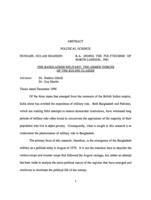- Collection:
- Atlanta University and Clark Atlanta University Theses and Dissertations
- Title:
- The Bangladesh military: the armed forces of the ruling classes, 1996
- Creator:
- Hussain, Gulam M. S.
- Date of Original:
- 1996-12-01
- Subject:
- Degrees, Academic
Dissertations, Academic - Location:
- United States, Georgia, Fulton County, Atlanta, 33.749, -84.38798
- Medium:
- theses
- Type:
- Text
- Format:
- application/pdf
- Description:
- Of the three states that emerged from the remnants of the British Indian empire, India alone has avoided the experience of military rule. Both Bangladesh and Pakistan, which are making fitful attempts to restore democratic institutions, have witnessed long periods of military rule-often brutal to circumvent the aspirations of the majority of their population who live in abject poverty. Consequently, what is sought in this research is to understand the phenomenon of military rule in Bangladesh. The primary focus of this research, therefore, is the emergence of the Bangladesh military as a political entity in August of 1975. It is not the intention here to describe the various coups and counter coups that followed the August carnage, but rather an attempt has been made to analyze the socio-political nature of the regimes that have emerged and continues to dominate the political life of the society. This study traces the social origins of Bangladesh military; its political advent; various 1 social-engineering' it has pursued to stay in power and other 'means' to stifle dissent. When these aspects of 'praetorianism' are clearly focused the reader conjures up an image of blatant human rights violations and economic degradation perpetuated by one of Third World's most notorious armed forces - the Bangladesh military. The thesis attempts to analyze the problems of Bangladesh's political development from a marxist perspective using the tool of class analysis to determine the nature of social formation since the military coup. Therefore, the paper rejects conventional frameworks which are either conservative or liberal for understanding Bangladesh's political development under military regimes and espoused a radical frame of reference, i.e., class analysis to perceive the 'situation' which has manifested in the growth of a military � bureaucratic oligarchy whose fortunes are intimately tied up with access to external resources in the name of 'modernizing' Bangladesh.
- External Identifiers:
- Metadata URL:
- http://hdl.handle.net/20.500.12322/cau.td:1996_hussain_gulam_ms.pdf
- Rights Holder:
- Clark Atlanta University
- Holding Institution:
- Atlanta University Center Robert W. Woodruff Library
- Rights:
-
